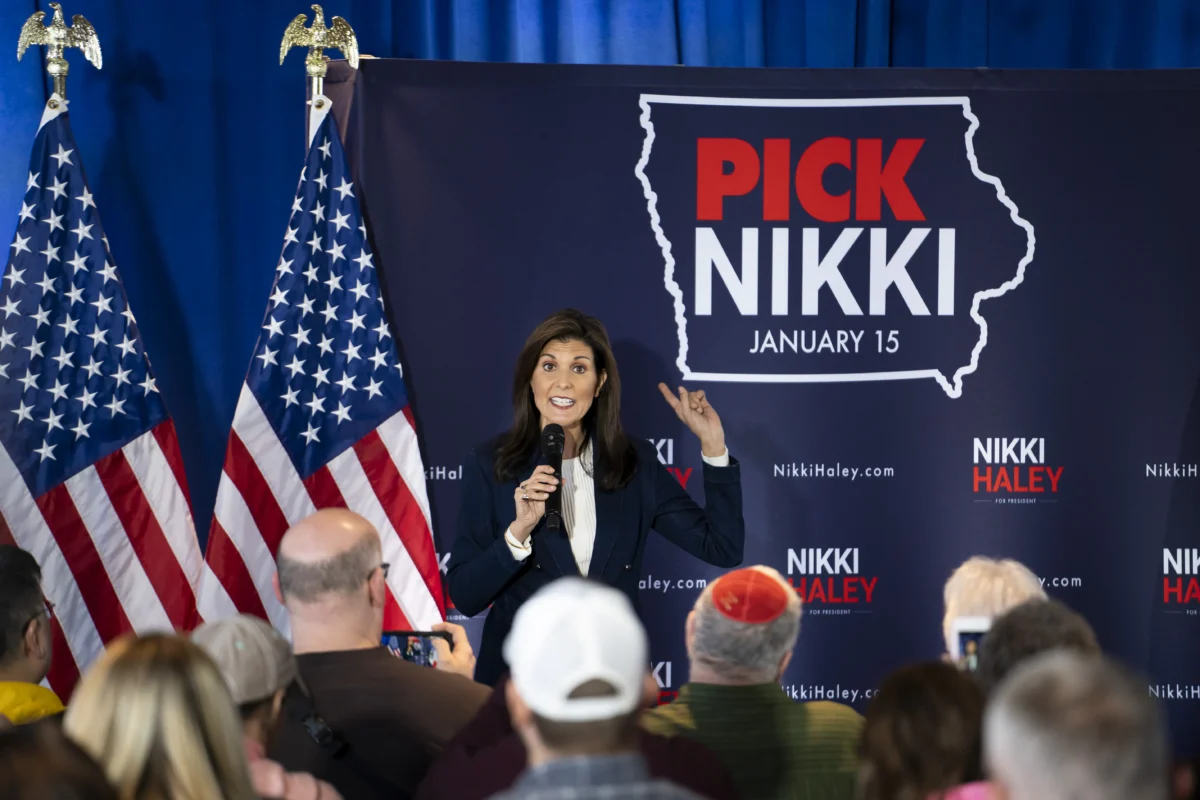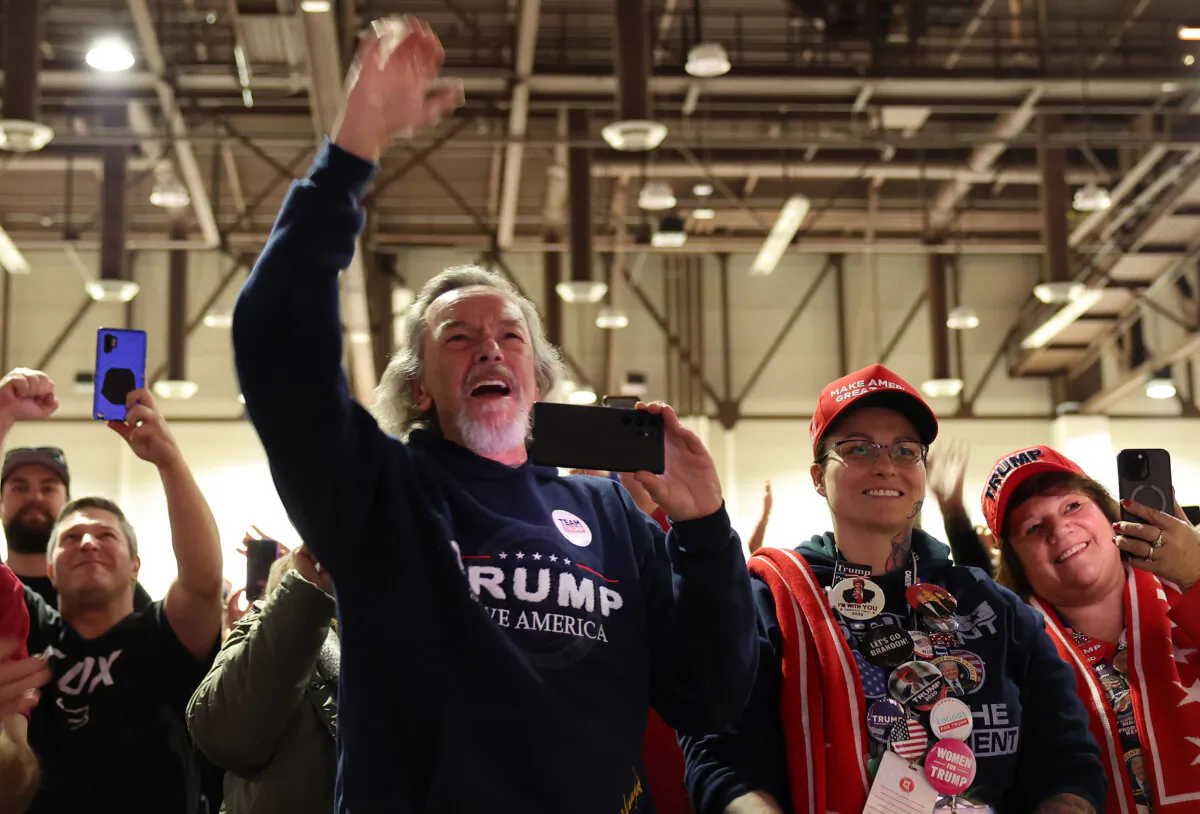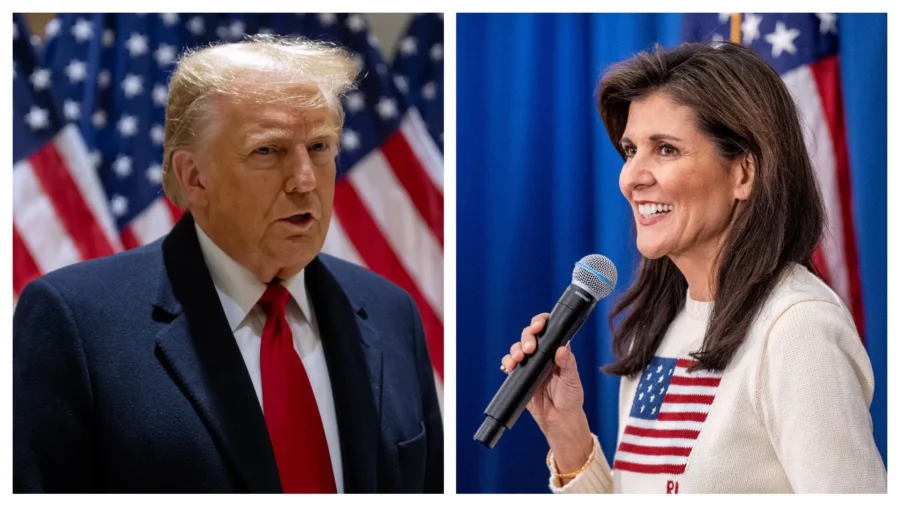News Analysis
This year’s presidential preference contest in Nevada will be one of its strangest.
Rebelling against a Democrat-led change in state law calling for a primary election, the state GOP will hold caucuses on Feb. 8, pitting former President Donald Trump against a little-known candidate, Texas businessman Ryan Binkley. President Trump is virtually assured the victory.
But Nevada Republicans may also vote in a state-run primary on Feb. 6. That contest, not recognized by the GOP, counts for bragging rights only.
When forced to choose between the caucuses that include President Trump and the inconsequential primary without him, GOP challenger Nikki Haley opted for the latter.
Now, she confronts a bizarre situation: Her most formidable adversary on the primary ballot appears to be “None of These Candidates,” an unusual option that Nevada voters have been afforded for decades.
Based on a new poll and political insiders’ observations, “None” might draw the most votes in the primary.
“It’s my most fervent hope that ‘None of These Candidates’ wins the Nevada Republican primary,” Bruce Parks, chair of the Washoe County GOP, told The Epoch Times. He said he’s voting for “None” and then will caucus for President Trump–which all Republican voters are allowed to do.
Likewise, Nevada Gov. Joe Lombardo has publicly stated that he would do the same.
If “None” draws more votes than Ms. Haley does, “that will send a message” to her and other candidates who overlook Nevada, home of the First in the West nominating contest, Mr. Parks said.
He made his remarks just before a new poll showed that 59.2 percent of Nevada’s Republican primary voters would choose “None,” while 40.8 percent would pick Ms. Haley, the Washington Examiner reported.
‘It Means Nothing’
The Haley campaign declined to comment for this story, instead pointing to newspaper articles critical of the Republican Party’s decision to persist with its caucuses. An editorial in the Las Vegas Sun said the GOP was causing confusion by “hosting private nominating parties that are gift-wrapped for disgraced former President Donald Trump.”
Mr. Parks retorted that the time-honored caucuses are fair and transparent, and he disputes the “narrative” that the caucuses are “rigged” in favor of President Trump.
Caucuses are said to benefit candidates who have particularly dedicated, enthusiastic supporters—terms often used to describe President Trump’s supporters. They may be more willing to spend greater time and effort to participate in a caucus in person on one day only; it’s quicker and easier to cast a primary ballot in person or by mail.
Mr. Parks described the caucusing process: “You walk in, you show an ID. We confirm that you’re Republican, we hand you a ballot. That ballot has the names of the candidates on it. You mark that ballot however you see fit and then you put it in the box. And that box is counted in front of anybody that wants to observe at the end of the night.”
Mr. Parks challenged the naysayers telling him how such a system is slanted toward any particular candidate. He also said that the party has taken great pains to educate voters about this year’s strange primary-and-caucuses setup.
He says he has fielded quite a few calls from people asking what to do with their mail-in primary ballots. Mr. Parks said he has advised them: “There are three things you can do with it. You can mark ‘None of These Candidates,’ and hope that that ‘None of These Candidates’ wins, because that would just literally send a message. Or you can shred it. Or you can use it to blow your nose. Either way, it has no significance; it means nothing.”
Many Nevadans feel that Ms. Haley neglected the Silver State, Mr. Parks said. The former South Carolina governor focused her campaign in other states, including her home state.
Haley Gives Her Rationale
“Talk to the people in Nevada, they will tell you the caucuses have been sealed up, bought and paid for, for a long time. And so that’s why we got into the primary,” Ms. Haley said on Jan. 21 in response to a question from The Epoch Times at a campaign stop in Epping, New Hampshire.
“But we know the caucus is what it is. And these are people who are involved in it that tried to stop it. That’s the Trump train rolling through that, but we’re going to focus on the states that are fair.”
South Carolina has 50 delegates at stake, nearly twice as many as Nevada.
In January, the news media’s spotlight focused on Iowa and New Hampshire, both of which President Trump won handily.
Attention about the Republican nomination has mostly bypassed Nevada and is trained largely on South Carolina. A possible race-deciding showdown between her and President Trump, her former boss while she served as U.N ambassador, looms on Feb. 24.

What If ‘None’ Wins?
Before then, Ms. Haley could face an embarrassing outcome if “None” beats her in the Feb. 6 Nevada primary. If that happens, she would still be declared the winner, officials said. But that win would be purely symbolic; the victor of the primary will accrue none of the state’s 26 delegates to the GOP’s nominating convention this summer.
The Republican Party will award some or all of those delegates to the winner of the Nevada caucuses, not the primary. To become the Republican nominee, a candidate must receive a majority of delegates—1,215—at the national convention.
“From my perspective, any candidate that signed up for that primary basically told the entire state of Nevada that they don’t care about Nevada,” Mr. Parks said.
He resents “wasting $5 million of Nevada taxpayer dollars” to hold the primary that Democrat lawmakers foisted upon Republicans, who have traditionally used the caucus method to pick their favored candidate.
President Trump’s campaign released a statement questioning Ms. Haley’s rationale.
“She inexplicably signed up to be included on the state primary ballot despite the fact that she could not earn delegates in the primary,” the Trump campaign said. “President Trump will be the only significant candidate on the caucus ballot, allowing him to win the state’s delegates. We wonder what the Haley campaign was thinking!”
Trump Showed Up
Mr. Parks said that while Ms. Haley has been “a nonentity in Nevada,” President Trump has made several recent appearances in the state.
Most recently, he held a Jan. 27 “commit to caucus” rally in Las Vegas.
During that speech, the former president underscored the importance of the caucuses.
“Don’t waste your time on the primary,” he said. “Get everyone you know out to vote in the Nevada caucuses on Feb. 8.”
He criticized Ms. Haley’s decision to participate in the primary and suggested that the move may have been made for “public-relations purposes.”
Pollster Rich Baris said President Trump should have urged people to go vote for “None” on Feb. 6 and then also vote for him in the caucuses.
Ms. Haley is certain to lose the caucuses since she’s not even on the ballot; the primary “could humiliate her” if “None” tops the vote tallies in the primary, Mr. Baris told his podcast audience on Jan. 29.
The Trump campaign released a statement on Feb. 1 emphasizing “10 important facts” about the Nevada caucuses.
Showing up in person on Feb. 8 “is the only way to vote for President Donald J. Trump and support his winning the official Republican Nomination for President,” the campaign said, noting that the caucuses run from 5 p.m. to 7 p.m. local time.
“You may still participate in the Caucus even if you already cast a vote—by mail, in person, or otherwise—in the Tuesday, February 6th ‘meaningless primary,'” the campaign said.
President Trump, Mr. Binkley, and Florida Gov. Ron DeSantis will appear on the ballot. Because Mr. DeSantis recently suspended his campaign, “only caucus votes cast for President Trump or Binkley will be counted toward awarding Nevada’s delegates,” the notice said.
Caucus locations are listed at NevadaCaucus.GOP.

Haley Faces Dilemma
Regardless of whether “None” gets the most votes, Ms. Haley will have racked up three straight losses—Iowa, New Hampshire, and Nevada—before heading to the First in the South primary in her home state, Mr. Baris noted.
Ms. Haley has been arguing that she has momentum on her side as her vote-garnering percentages have increased. She is continuing to argue that she is a much younger, drama-free alternative to President Trump.
But she has fallen out of favor in her home state of South Carolina, trailing him by about 27 points in the RealClearPolitics average of opinion polls.
For any candidate, a loss in one’s home state would be virtually unrecoverable, Mr. Baris said, noting, “It’s the thing that political obituaries are made of.”
The Nevada outcome could therefore influence whether Ms. Haley decides to remain in the race, as she has vowed to do, or to exit, as Mr. Baris and others say she should.
Mr. Baris said he was unable to name a single state where her prospects look good; her best shot was New Hampshire, where she lost by 11 percentage points to President Trump despite large numbers of independents and Democrats voting for her.
In Nevada, voters must have declared they are Republican at least 30 days prior to the caucuses.
“None of These Candidates” has been, at times, a popular option for voters since its introduction in 1975, according to a 2011 study published in The Social Science Journal.
Voters who choose “None” do so either because they are uninformed about the contest or because they want to protest against the other choices, the study said.
Most voters who opt for “None” would “probably have left parts of their ballot blank,” it stated, noting that offering this choice “does not drain votes from third-party candidates, as some have feared.”
Jackson Richman contributed to this report.
From The Epoch Times


